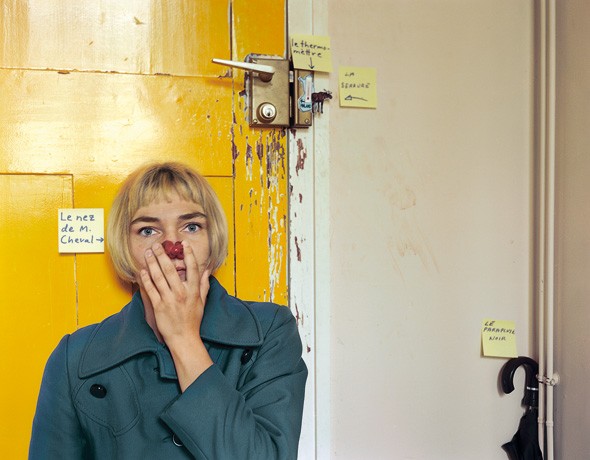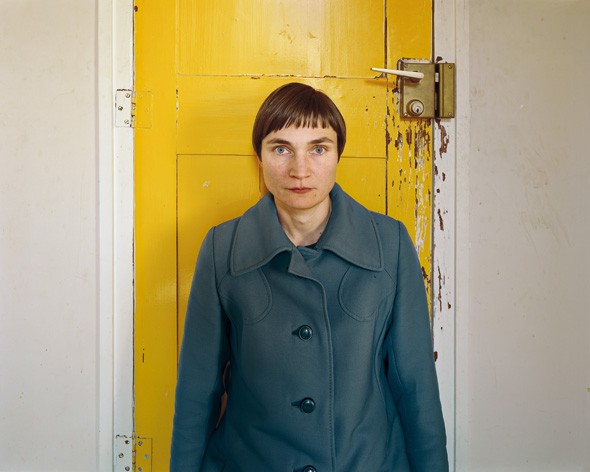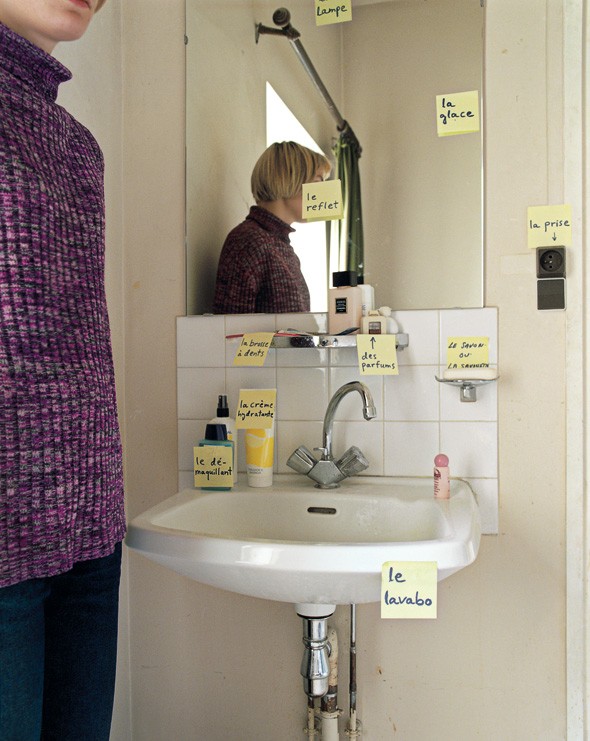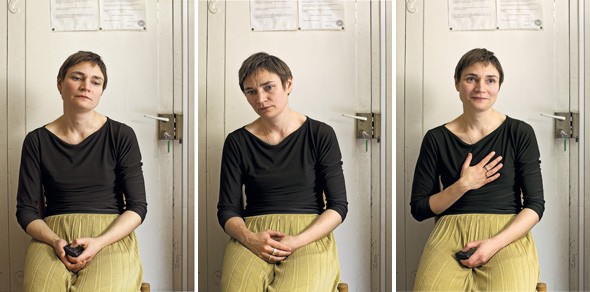Elina Brotherus & Riikka Ala-harja
The passing of time
2 March 2015 | Extracts, Fiction, Prose
In 1999 the Musée Nicéphore Niépce invited the young Finnish photographer Elina Brotherus to Chalon-sur-Saône in Burgundy, France, as a visiting artist.
After initially qualifying as an analytical chemist, Brotherus was then at the beginning of her career as a photographer. Everything lay before her, and she charted her French experience in a series of characteristically melancholy, subjective images.
Twelve years on, she revisited the same places, photographing them, and herself, again. The images in the resulting book, 12 ans après / 12 vuotta myöhemmin / 12 years later (Sémiosquare, 2015) are accompanied by a short story by the writer Riikka Ala-Harja, who moved to France a little later than Brotherus.
In the event, neither woman’s life took root in France. The book represents a personal coming-to-terms with the evaporation of youthful dreams, a mourning for lost time and broken relationships, a level and unselfpitying gaze at the passage of time: ‘Life has not been what I hoped for. Soon it will be time to accept it and mourn for the dreams that will never come true. Mourn for the lost time, my young self, who no longer exists.’

1999 Mr Cheval’s nose
10 years later
When I am seven I get a head.
I sit as a model for many weeks. The sculptor lives at school; I sit for my portrait at her house. Sometimes I am allowed to fetch books from the school library and leaf through them. The sculptor has a big, light-filled home. She does not have a husband or children; she has time for my head.
I sit opposite the sculptor, swinging my legs.
Three hours later my dad picks me up in our rust-red Saab 96. We sit alongside each other; we don’t talk.
Dad never locks his car.
A month later, the sculptor says the head is ready.
We go to see it, the whole family.
The concrete sculpture is exactly the size of my head.
The expression is serious but not sorrowful.
The sculptor wraps the head in towels. She says we can keep the towels.
Dad puts the head carefully into the Saab’s boot.
I am grey. I am seven.
At home, the head is placed on top of the dresser.
When I tell her I am moving to France, my mother gives the sculpture to me.
The concrete head weighs ten kilos. I am thirty-seven years old; my head is thirty.
I recline the back seat of my Saab 900 and stuff the luggage space full of clothes and dishes. I shove books and plates under the front seat. I wrap the concrete head in a towel and put it in a basket my mother has given me. I pack the Saab I have inherited from my dead father full of all the stuff that will fit into it. I fill the last spaces with knickers and socks.
I transport the concrete head across Europe. My right foot goes dead on the gas pedal, every now and then I have to wiggle it. Fields and intersections flash by. I have stockpiled nuts in the glove compartment, it is the beginning of September, schoolchildren have been kidnapped in Beslan, Europe is hot. I gulp water from a bottle. I stop at petrol stations for the toilet and to fill up. I wolf down the kilometres, push through the dark. I do not want to leave the Saab outside a -hotel. If someone were to steal the car now, I would lose all of my carefully chosen possessions.
In the dark, I cross the French border and by midnight I am in Normandy.
The streets are deserted.
My man meets me in front of a high cedar hedge.
We unload the car straight away. We laugh.
I lift the concrete head from its basket and place it in an empty space on the bookshelf.
GAME
I try to hit the shuttlecock so that the other player can’t return it. Some can’t. I have become a member of the badminton society and am permitted to play with any of its members. I know my numbers from the Eurovision Song Contest. My feet move swiftly over the hall floor, I am in rhythm. I leap high, hitting to the very left of the court. The city police chief tries to return the ball, but he can’t reach. The point is mine. I smile. We don’t need to speak.
I bump into the police chief on the town hall hill. I greet him. A chance badminton club’s opponent has given me the first person I can say hello to. I am delighted. I have come to the town hall to apply for a social security card. I need it. I am expecting a child.
STRAWBERRY
I am standing among people. I have been invited to a party, even though the only guest I know is my husband. I understand nothing of the rapid talk. I try to nod in the right places.
During the night, strange words circulate in my head. I get up and write them down on a piece of paper. I go to the bathroom to drink water. I knock a cough medicine bottle off the shelf under the mirror and into the toilet. The glass bottle shatters and a brown liquid spreads on the white porcelain. I do not have the energy to clear it up; I will deal with the mess in the morning. I lie on my bed. My head weighs a ton.
In the morning I look at the words I have written down on the piece of paper. There are not many of them. I need more words, I need them badly, only then can I open my mouth.
How can I learn to pronounce the words right?
How can I learn to speak fast enough for anyone to want to listen to me?
I tidy up the bathroom and stand in front of the mirror. I pronounce words with exaggerated expression. No one hears how superbly I can speak a foreign language.
Some mornings speaking is more difficult, sometimes it is easier.
The strawberries rot in the bowl. In the morning I cycle over to the market. I tell the stall-holder that she has sold me strawberries that only lasted two hours before they rotted. I say that I am not a tourist. Maybe the woman will understand that after this it is not worth selling me old strawberries or give me the wrong change as she does to those she suspects are English, the ones who will leave the harbour by ship the same evening.
I live here.

2012 Room Nr 10 (yellow door)
CHILD
As soon as I take the baby in my arms, my mother tongue shoots out of my mouth like a bullet. I begin to speak my own language to my child.
The child cries a lot, she is red and wrinkly and I do not know how to look after a baby. I stay awake. The concrete head gazes down from the bookshelf. With the child in my arms, I walk in the living room, beside the cedar hedge, on the sandy beach.
TOILET
The toilet gets blocked. I ring the handyman. He says that the roots of the cedar hedge have penetrated the pipes and blocked them. I know the handyman. A month earlier I asked him to change the bathroom mirror. I had thrown my sneaker at the mirror. I was aiming at my husband. The fragments clinked to the floor.
The handyman suggests I claim the toilet repairs on the insurance.
The handyman says that insurance is for crises.
A month later we get the money from the insurance.
But the crisis goes on. The child speaks and walks, you can already explain a lot of things to her, but not this. I can’t explain it even to myself, not in any language.
The mirror is unbroken and the pipes unblocked.
I stand in front of the mirror.
For the first time I notice that I have some grey hairs.

1999 Reflection
RETURN
I wrap the concrete head in two towels and set it -carefully in its basket. Dad’s old Saab is full to the gunwales. I stuff naked Barbies into the last spaces. The bottom of the car has rusted in the rain and the damp wind. I fear that the Saab will not make it to Finland. The man from the garage next door inspects the car, but does not promise anything.
The pear tree I received as a fortieth birthday present stays in the green fields of Normandy.
On Whitsunday I set off, driving to the north-east.
I fetch the child later, most precious of all.
I drive the same route back, but the road looks different, as if it had changed in seven years. From time to time there is fog on the road, but I only take a wrong turning once. I sleep in a motel, I don’t care any more if someone breaks into the car.
Just before the German harbour I take a turning into the forest and drive to a sandy beach. I unwrap one of the towels from the concrete head and go for a swim. The towel is soft, it wipes the salty sea water from my skin.
In the car-ferry cabin I look at my temples.
I decide to start colouring the grey away.
When I drive off the ferry at Vuosaari, a mangy fox runs along the hard shoulder.
CEDAR HEDGE
I walk toward my former home. The linden trees of the Boulevard de France have not grown since I last saw them. They have been well disciplined, branches have been trimmed every year so that they will not block the car-drivers’ line of vision.
I have not been to the house for three years. I have not been invited.
Now I have been.
I have reached the cedar hedge.
I ring the doorbell.
The door opens.
My child stands, smiling, between her father and her grandfather.
I kiss grandfather on the cheeks. He fought in Algeria. At our last Christmas, he showed me his army cap. He still has a soldier’s bearing. He is smiling. He was smiling ten years ago when we were introduced.
Grandmother comes from the kitchen, her apron round her waist, and greets me.
She is just as beautiful as before.
The living-room rugs look the same as they did, as if no one had walked on them since the child and I left.
The painting I nailed to the wall still hangs behind the sofa.
Everything looks the same as before.
I sit next to grandmother and eagerly tuck in to scallops fried in butter. We talk about the rainy weather and the unusual cold. The scallops are excellent. Grandmother has two ways of frying scallops; today she has chosen the one I like better.
The pear tree has grown at least half a metre.
We laugh about it together.
We laugh when the child says she supports France in football and Finland in ice hockey.
Outside, the wind blows.
We talk about pleasant things. The apple cake is soft.
It is time to go. Grandfather helps me on with my coat. The child waves from the door between her father and her grandmother. She will sleep one more night in her French home and return to Finland with me tomorrow.
We have got used to travelling.
I walk. The pavement’s asphalt is completely fractured; it’s bumpier than it was. The linden trees’ roots push at the surface and break the asphalt, and a new layer of asphalt lasts no more than a moment.
It begins to rain.
The rain washes the road clean.
This is my path, this is the way I go.
Before bedtime I brush my teeth in front of the hotel mirror.
My expression is serious, but it is not sorrowful.
I am grey, I am concrete, I am forty-seven.

2012 Emotional exercises V
Translated by Hildi Hawkins
Tags: photography, short story
No comments for this entry yet
